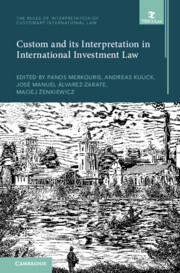In international investment law, as in other fields of international law, the interaction between treaty practice (including their interpretation and application) and customary rules of international law has become a fertile ground for doctrinal discussion. Two issues related to this discussion are particularly worth mentioning at the outset of this volume on Custom and International Investment Law.
The first question is whether and how a large number of bilateral investment treaties (BITs) may contribute to the formation or declaration of customary rules of law related to the content of these treaties. In other words, the question may be framed as to whether the substantive protections recognized in a fairly similar manner in large numbers of BITs is an expression of a customary rule with the same content. Several international judgments have so far confirmed that a multilateral treaty may declare the content of a rule of international customary law. For example, many international investment arbitration tribunals have upheld the declaratory nature of customary rules contained in the 1969 Vienna Convention on the Law of Treaties, such as Articles 31 to 33 about treaty interpretation. In contrast, no international tribunal (different from investment arbitration tribunals), United Nations General Assembly resolution, or any other equally authoritative body so far has conclusively affirmed that the substantive provisions of BITs declare the content of customary rules of international law. In sum, the uncertainty remains about the customary nature of the rules included in BITs and their arbitral interpretations.
A second question refers to the application by international investment arbitration tribunals of customary international law that is recognized independently from the BITs. The extensive discussions by arbitral tribunals, government officials, and scholars about the scope of the minimum standard of treatment and the fair and equitable treatment standard in regard to different states and treaties are an example of the complexities involved in articulating this relationship between treaty and customary rules of international law. Some may even say that a state that systematically invokes a certain historic jurisprudence to prove the content of a customary rule is a persistent objector against the formation of new and more advanced customary rules on that matter.
The discussion about the existence of customary rules of international investment law may also be approached from the perspective of the effectiveness of those rules. This effectiveness depends to a large extent on the availability of an enforceable, international judicial remedy. States, of course, have the upper hand by modifying the judicial means of dispute settlement through new treaties, in application of the well-established principle of lex posterior derogat priori. Depending on how states modify the dispute settlement system, they will influence the interpretation and application of the substantive rules on international investment protection, even regardless of whether these can be classified as strictly of treaty or customary nature.
In conclusion, customary and treaty rules of international investment law develop in a simultaneous and potentially interrelated manner. Together, these sources form a dynamic body of rules that develop in the shadow of the states’ powers and preferences in changing times. I congratulate the authors and editors of this volume for pointing to specific examples, case studies, and related legal developments that frame the broader discussion on how States want to treat foreign investments.

